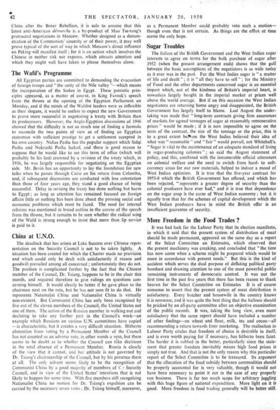More Freedom in the Food Trades ?
It was bad luck for the Labour Party that its election manifesto, in which it said that the present system of distribution of meat should be made permanent, appeared on the same day as a report of the Select Committee on Estimates, which observed that the present machinery was creaking, and concluded that " the time has now come when a scheme might be prepared which would be more in accordance with present needs." But this is the kind of accident which serves the dual purpose of deflating political party bombast and drawing attention to one of the most powerful public remaining instruments of democratic control. It was not the first time in the past five years that there has been reason to thank heaven for the Select Committee on Estimates. It is of course nonsense to assert that the present system of meat distribution is satisfactory. Every butcher and housewife in the country knows it is nonsense, and it was quite the best thing that the balloon should be pricked by an all-party committee after an objective examination of the public records. It was, taking the long view, even more satisfactory that the same report should have included a number of other findings—on wheat and flour, milk, tea and cocoa—all recommending a return towards freer marketing. The realisation in Labour Party circles that freedom of choice is desirable in itself, and is even worth paying for if necessary, has hitherto been faint. The harder it is rubbed in the better, particularly since the state- ment that greater freedom inevitably means high food prices is simply not true. And that is not the only reason why this particular report of the Select Committee is to be treasured. Its argument that the allocation of the food subsidy between commodities should be properly accounted for is very valuable, though it would not have been necessary to point it out in the case of any properly run business. There is far too much scope for arbitrary juggling with this huge figure of national expenditure. More light on it is good. More freedom in food trading generally will be better still.


































 Previous page
Previous page